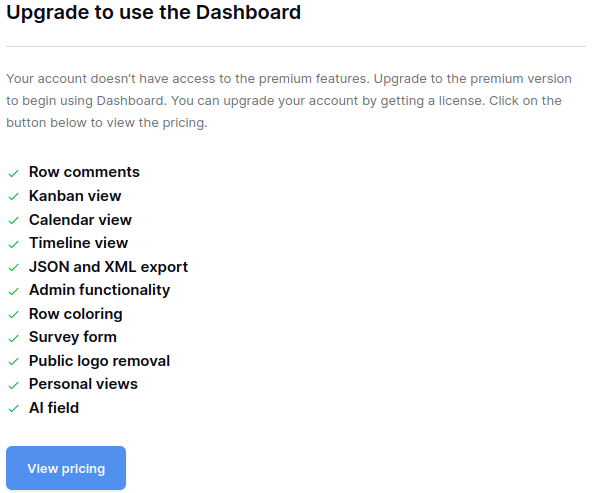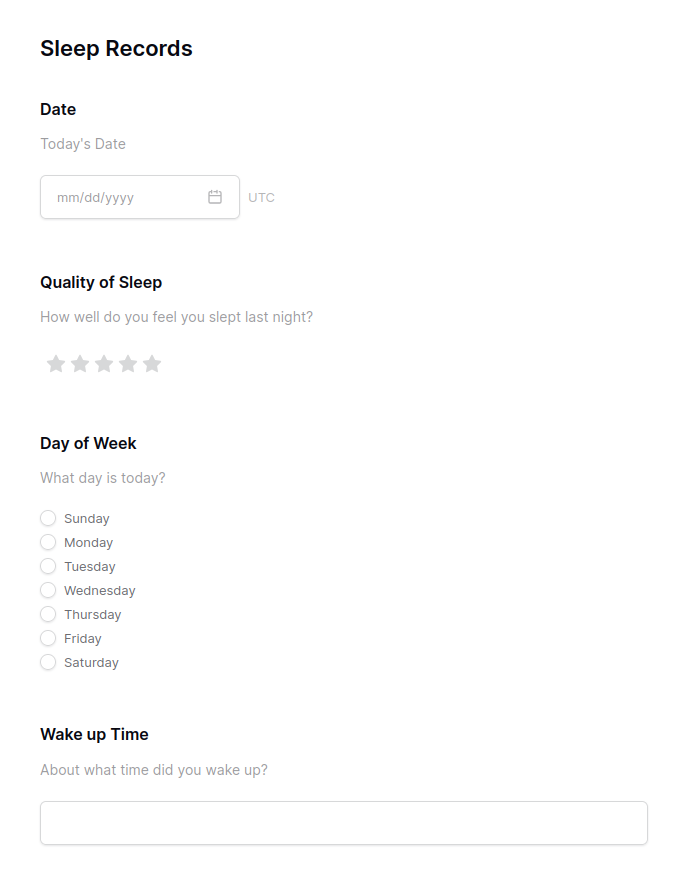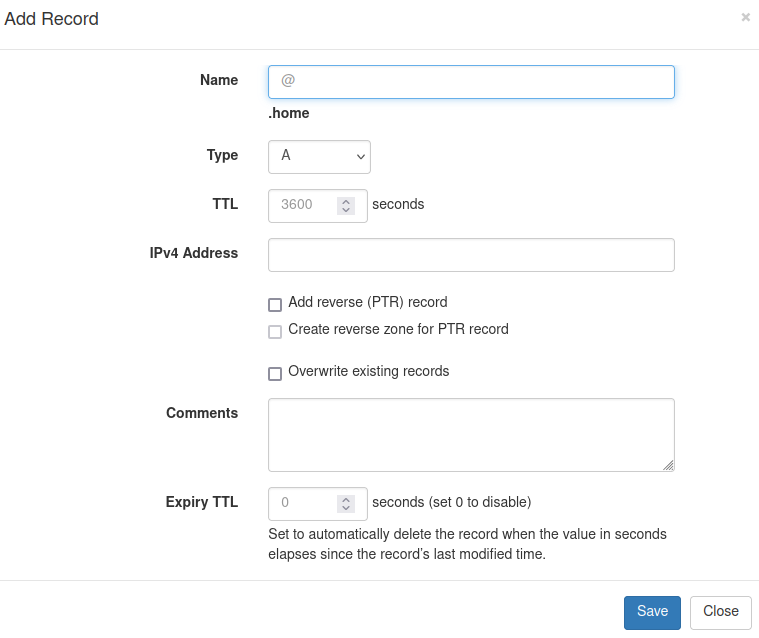In no particular order, the most essential ones are those I constantly use throughout my day and also weekly.
Proxmox holds all of these in different LXC’s and VM’s
- Home Assistant
- Pocket-ID - https://github.com/stonith404/pocket-id (Exclusive Passkey login system as in -no un/pw just your Passkey which - doubles as an OIDC provider)
- Homepage (By Ben Phelps of gethomepage.dev)
- Vaultwarden
- TechnitiumDNS which handles all of my DHCP and Adblocking in a one system, extremely capable software especially useful for SOHO too.
- Baserow - Airtable alternative. It holds certain items of importance like what MAC address each device in my home network holds and what IP It uses in an intelligent view. I also was using it for a while to log issues with my sleep where I deal with insomnia, so I logged how well I slept, how many times I woke up, how long it took me to fall asleep etc. That was a simple form I created using drag/drop in Baserow and called by a URL.
- OpenVSCode server - makes editing my Homepage (above) yaml and my docker-compose files a breeze! It’s especially nice when you edit it something and it auto saves almost instantly. Makes some of my services change in real-time!
- UptimeKuma - Simply one of the best out there for me
- Gotify - I get alerted to my Tuya based dehumidifer tank being full via Home Assistant, Downtime alerts from UptimeKuma and a variety of other services which I deem higher priority alerts over “fix when you can” ones.
Aside from that, i do have other services I use every so often like Memos, Joplin Server (holds most of my notes), Pingvin and a few others.
+1 for UptimeKuma. Works great.
I tried Baserow a while ago but decided not to use it because it started downloading the application after running the container and required an online account (that could also be NocoDB). How has your experience been after using it for longer?
I had to create an account as per the usual process for these types of apps, but it was all local. I never had to do one to connect to their servers. I know it generates a unique instance ID which I believe phones home to their servers but I don’t mind personally.
As for my experience, a lot of it is locked behind their paid plans, so I just keep it limited to what I use which is fine. I do like it as it does better than NocoDB for my needs (the input forms is what I needed) and it does better there. I don’t recall the other reasons for not using NocoDB otherwise, but it’s a long while.
Their pricing is here: https://baserow.io/pricing

So, that’s mostly what is locked behind. My sleep form I built which feeds the database:

Overall, it does meet my needs so that’s all I ask. :)
Does Technitium support DNS rewrites like Adguard Home?
I’m about 99% sure it does, I don’t use it that way but It does allow DNS zones. For example:

It’s a lot more technical then Adguard Home for sure. Both work just fine though, I came from Adguard Home as I use a PXE server to provision some of my devices and Technitium is super easy to configure that.
Paperless-ngx
The rest is already in the other comments
-
Samba (I can move files now, sweet!)
-
Jellyfin (I can watch stuff, sweet!)
-
Qbittorrent-wireguard (for pirating copyrighted material from the internet illegally)
-
Somesuch Wireguard solution (for accessing the backend and doin stuff)
-
A proxy somewhere else
The rest is extra. This gets my usual goals completed pretty well.
for pirating copyrighted material from the internet illegally
I’m pretty sure that’s not the phase we use now
“Archiving legally purchased content as an insurance against corporate-sanctioned theft”?
-
Opnsense
Vaultwarden
Email
Home assistant
Emby
Gitea
Paperless-ngx
Firefox
Honest question, I’d love to host email but it seems like a huge pain in the ass these days with trying to keep from being delisted. Is there a decent, home user accessible email system that’s useable out there?
A decade ago it was easy and doable but even in professional life I don’t deal with email backend anymore, all google or o365.
Highly recommend purelymail. No nonsense mail, with straight forward pricing.
I use an SMTP Relay for sending mail, so I don’t hit issues with sending.
You’ll never get away from maintenance for ant service you host, and you need a VPS at a minimum to handle mail unless your ISP allows it (which they probably don’t). There’s going to be front loading needed in order to make sure the IP you’re given isn’t on blocklists, and you’ll need to take appropriate measures with Apple, M$, Google, Yahoo, etc in order to send email to their domains. The good thing is that I’ve you do that, you’ll never need to touch it again.
I personally use iRedMail because of the breadth of documentation, but mailcow and others like that are allegedly nice. I prefer the omnibus solutions because I don’t care to do manual service configuration if it’s not necessary.
Been doing email hosting for my domain for 25 years, 12 years with iRedMail.
I’m also using iredmail. Apart from it needing more hardware than it used to its been pretty stable. I use an SMTP Relay for sending mail, so I don’t hit issues with sending. Not that I ever actually send many emails.
Firefox
You mean you self-host your profile?
No. I host Firefox that runs in a browser.
It’s one of my favourite things. So places that may block certain sites can be bypassed.
Not sure why I was downvoted for answering a question accurately.
How do you self host Firefox? This is something I’d like to setup!
It’s this: https://github.com/jlesage/docker-firefox
Arr stack plus Jellyfin/Plex, Nextcloud and Gitea.
- Pihole (if that service goes down, everyone in my house gets mad at me)
- Jellyfin
Everything else is a nice to have, not essential
The arr family with a torrent client is great for feeding Jellyfin. If you are a developer, you can host your own shit there too. Game servers for playing with family and friends (so far Minecraft, Terraria, Project Zomboid, V Rising). I like to host a bunch of different telegram bots I wrote for fun. Discord bots are another interesting side. I also run some automation runners for helping out with testing, building and deploying my projects.
Focus on your needs and what you want to improve of your online life, there is probably a project you can self host for it.
(if that service goes down, everyone in my house gets mad at me)
I bought a PiZero and set it up as a redundant pihole for this reason. It’s slower because it’s wireless, but not super noticeable since it’s ‘just’ DNS. I have the router pointed at the main and backup all the time and if I need to do something (or break the main one messing with dockers) there’s still the backup until I get the main up.
I messed around with some High Availability configs where they both had the ‘same’ ip but could never get it working smoothly. I just use the teleporter functionality within pihole any time I update anything to keep them in sync, which is rare.
I did something similar, but then I turned my pizero in a portable retro console lol.
Nextcloud, vaultwarden.
Nextcloud for sure.
Some WebDAV server, can be Nextcloud but actually something more lightweight is better.
Also a XMPP server is very nice to have. Even if you don’t have many contacts on it (yet), it works very well has a notification service and can even be extended to act as a Unified Push distributor.
and can even be extended to act as a Unified Push distributor.
wait wait wait wait.
That works? Teach me how!
Radicale is next on my list
For me:
- Card/CalDAV baikal : so that I can sync my calendar and address book across phone, tablet, workstation, and laptop
- Messaging prosody/synapse : private chatting with family.
- File sync Nextcloud : for access to various files. This is the only one that has worked consistently for me. Syncthing et al would constantly lose connection and the file I needed wouldn’t be there. Works fantastic for syncing Joplin notes.
- VPN wireguard : to access things remotely and securely
- Audiobooks audiobooksheld : I have a ridiculously large audio book library and enjoy listening to them when driving. This way I don’t have to preload my phone.
- Ebooks calibreweb : another large library. I have separate instances for different types: Magazines, regular books, RPG/gamebooks.
- Version control forgejo : for coding and creative writing projects.
- bookmarks shaarli : I find myself using this less and less. I use Firefox’s built-in sync, so I’m thinking about switching to separating selfhosting that instead of shaarli.
- Photos Synology : looking forward to immich getting stable. Once they get past regular breathing changes I’ll move over to that.
I have stopped using most of the services that got me into selfhosting. Things like rss and wikis. I try new things from time to time but kill them if I don’t find myself using them regularly or if the maintenance cost is more than the value add.
where do you source your magazines from out of interest? Are they epubs etc?
WireGuard on my VPS, because otherwise I’m stuck behind CGNAT and can’t access anything in my network from elsewhere. Or Tailscale, but that’s not really self-hosted.
do you have a good guide on how it works/ho to set it up? I tried a little while ago but couldnt figure it out.
I used the Arch Wiki entry about WireGuard. The trickiest part was some MTU nonsense.
Tailscale is a bit simpler and I think I just figured it out with some docs on their website.
My three essential selfhosted services are :
- an XMPP server
- a CalDAV server
- a bookmark manager (Linkding)
No one metioned https://hoarder.app - bookmark app featuring offline archive, full text search and AI auto tagging
Arr stack, Jellyfin, and Nextcloud + some dashboard.
Tailscale
So headscale?
Headscale is not essential. Of course in this context the “self-hosted service” would be the Tailscale client…
Pepsi or Coke?
Yes.
Honestly, I’ve used both. Tailscale edges out headscale by a tiny bit just because of the admin console’s GUI but other than that, yeah.














